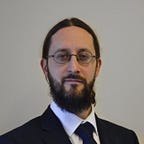Interview with Dr Benoît Collins
This is part of a series of interviews with academics. Find out more about Woolf and the academics who are driving research forward at woolf.university.
Dr Collins is Associate Professor in the Department of Mathematics at Kyoto University, Japan.
1. Benoît, you held permanent academic positions in mathematics in France (CNRS), Canada (University of Ottawa) and now Japan (Kyoto University). Could you comment on your core research interests and your experience across national traditions of research?
I am a mathematician, and I would qualify my research as pure mathematics. One of my core research interests is random matrix theory, which involves functional analysis, probability and some algebra. This field emerged in theoretical physics and statistics, before evolving into a domain of mathematics with many interdisciplinary ramifications. I like to say that I am interested in applications of pure mathematics. For example, in the last few years I have been very interested in application to quantum information theory, and in turn, quantum computing.
As for the national traditions of research, this is definitely a big question, probably even worth full length graduate studies! To keep it short, let’s start with a cliché: North American mathematicians (or even the broader English speaking world?) have a ‘can do’ attitude towards research and they probably host the best researchers; French mathematicians have a very strong history of excellent mathematicians, valuing mathematical studies and mathematical results; Japanese mathematicians value also a lot mathematics, and are extremely strong on the technical side. Although this cliché is a bit rough, there is definitely some truth in it. So, working in the same field on different continents with different cultures is very enriching…
2. Woolf education prioritises a personalised form of education. What is your understanding of tutorial teaching ad how do you think it could help students in mathematics?
Let me start with a concrete example. There is in France a system parallel to university teaching during undergraduate years 1 and 2, referred to as “classes préparatoires” (preparatory classes to enter “grandes écoles” — prestigious engineering / business / administration schools, which in general ensure their alumni a bright career). These “classes” are complemented by weekly one-hour 3-to-1 sessions with an instructor during which he challenges students’ knowledge, and more importantly, their know-how. Also, students learn to explain solutions and to develop a positive attitude towards problems that are too difficult. They are also expected to learn how to recover from failure and take advantage of it. These sessions are called ‘kholles’ — a schoolboy jargon whose etymology might come from ‘being stuck’ (on a problem).
I experienced these kholles both as a student and an instructor and I would refer to them as an indirect form of tutorial. This training might be tougher than tutorials, and also available to less for financial reasons, but people who survive it acquire invaluable competences.
I see this example as evidence that one-to-one teaching, or one-to-very few teaching can be optimal in mathematics too. As a matter of fact, the last year of BSc mathematical studies in Japan is often just a ‘seminar’ (the English word is used in Japanese), i.e. a meeting once a week with the professor. This is also close to a tutorial, and it indeed explains well the technical strength of Japanese mathematicians.
Last but not least, graduate supervision in pure mathematics is in my mind nothing but tutorial teaching…
3. What motivates you most in the Woolf project as a scholar and teacher?
Well, it all started by word of mouth. I found through social networks that my old friend Jonathan Duquette, with whom I shared some time at Kyoto University back in 2014, was involved in the Woolf project. I took a look at it, and I found that many shortcomings of nowadays’ university systems were very well diagnosed, and that very original and innovative solutions were proposed. So, I reached out to Jonathan.
I find it extremely interesting that the founding team of the project consists mostly of scholars in humanities. Although humanities and natural sciences often face different academic problems (e.g., in terms of teaching schemes, funding, etc.), as a scientist, I found very compelling their description of problems and was impressed by the technical level of the team when it comes to proposing solutions.
Many university systems are too inert, and many university resources are too illiquid. I sincerely hope that some highly innovative ideas proposed by the project will change that.
Learn more about the Woolf project and the people involved on the Woolf website.
